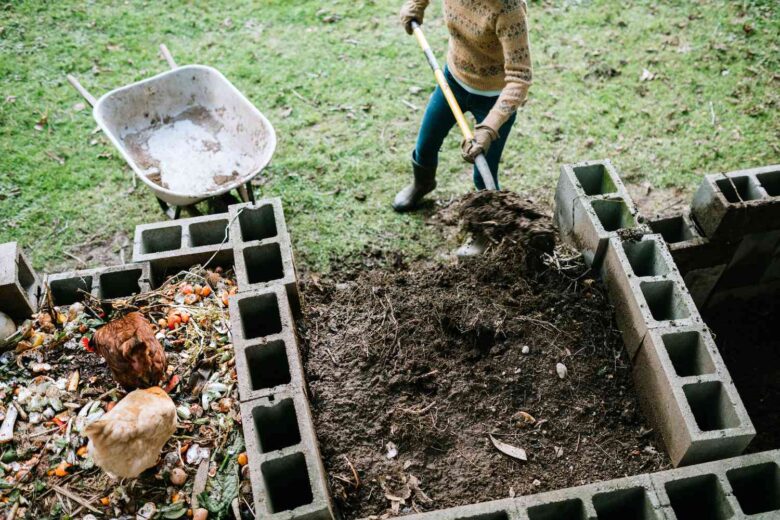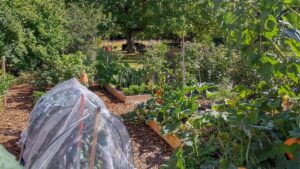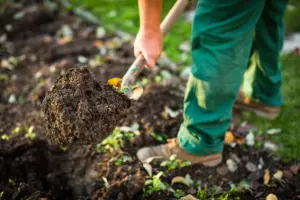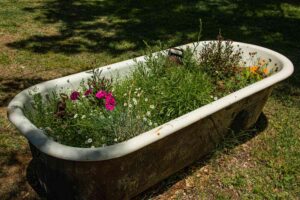People are looking for ways to have less impact on the environment as protecting the environment is becoming increasingly important. Our gardens are a place where we can embrace this sustainability initiative. Creating a waste-free garden is not only good for the environment, it is also fun and rewarding. This guide shows you how to transform your garden into a place where you can live in a way that benefits the environment.
1. Compost Magic:
Compost is an important part of the garden and ensures that no food is wasted. Don’t throw away kitchen and garden waste, but turn them into nutrient-rich compost. Composting not only reduces the amount of waste that ends up in landfills, it also provides something useful for your plants. Place a compost bin in a corner of your garden. Fill it with food scraps, grass clippings, leaves, and other organic matter. Over time, you will have nutrient-rich compost that will naturally improve your soil.
2. Save Water:
It is important to conserve water in the garden because it is a precious resource. You can collect rainwater to water your plants by installing rain barrels. You may want to invest in a drip irrigation system to ensure that your plants receive water directly from the roots and waste less water. You can also help save water in your garden by watering your plants at the right time and grouping plants that need the same amount of water together.
3. Choose Sustainable Materials:
Choose sustainable materials when planning and maintaining your garden. For raised beds, paths, and outdoor furniture, use new or old materials that have been recycled or upcycled. Plastic should be avoided where possible and if plastic must be used, consider using recycled plastic. By choosing sustainable materials you can reduce the need for new resources and make your garden more environmentally friendly.
4. Grow Your Food:
Growing your food is one of the best things about a zero-waste garden. Transporting food leaves a larger carbon footprint than necessary, but you can still enjoy fresh, organic food. Start with a small herb or vegetable garden and expand it over time. Using companion plants naturally repels pests so you don’t have to use harmful pesticides.
5. Natural Ways to Get Rid of Pests:
Instead of using chemical methods, use natural methods to eliminate pests and keep your plants safe. To control unwanted pests, introduce beneficial insects such as ladybugs and lacewings. Pest prevention can also be done through companion planting, where certain plants are planted together to help each other. Homemade solutions such as garlic spray and neem oil can help keep your garden healthy without harming the environment.
6. Waste-free Garden Tools:
Buy garden tools that are high quality and durable. Do not use disposable tools that can only be used once as this increases the amount of waste. Instead of buying tools that you only need occasionally, borrow or rent them. As your tools wear out, consider recycling options or come up with creative ways to reuse them in your garden.
7. Design Your Garden Carefully:
Consider how you can plan your layout to make your garden last. Choose plants that are native to your area, because they grow better there and require less care and water. Plants provide natural shade and windbreak, so you don’t need as many additional structures. To create a peaceful and sustainable garden, you can use permaculture principles such as designing to conserve energy and make the most of natural resources.
8. Teaching and Sharing:
Promote waste-free gardening in your community. You can organize workshops, talk about your experiences on social media, or join a gardening club in your area. Let your neighbors use eco-friendly gardening techniques. This will have a positive impact on the entire community, making it more environmentally friendly.
Conclusion
Creating a waste-free garden is a step towards a lifestyle that benefits the environment and makes gardeners happy and satisfied. By composting, conserving water, choosing sustainable materials, and doing other eco-friendly things, you can make the world a healthier place while turning your backyard into a thriving oasis. Follow the rules of waste-free gardening and your garden will become a source of creativity for a less wasteful future.
FAQs
1. What does ‘zero waste gardening’ mean?
When you garden with a zero-waste philosophy, you aim to produce as little waste as possible, reduce your impact on the environment, and promote long-term growth. It includes things like growing your food, composting, saving water, and using sustainable materials.
2. What’s the point of composting in the garden without using waste?
Composting is an important part of a zero-waste garden, as it turns food scraps and yard waste into nutrient-rich compost. By naturally improving soil, this compost reduces the need for synthetic fertilizers and the amount of waste that ends up in landfills.
3. What are some ways to save water in the garden?
Installing rain barrels to collect rainwater, using drip irrigation systems, grouping plants that need the same amount of water, and watering at the right time of day are all ways to conserve water in your garden. These habits help reduce water waste and ensure efficient water use.
4. What is a sustainable material? Why are they important in gardening?
Sustainable materials have little impact on the environment and encourage wise use of resources. Using recycled or upcycled materials to create raised beds, paths, and outdoor furniture can make gardening more environmentally friendly by reducing the need for new materials.
5. Why should I grow my food?
By growing your food in a waste-free garden you reduce the carbon footprint of transporting food, gain access to fresh, organic food, and have control over the growing process. It’s a fun and sustainable way to make our lives and our environment healthier.
6. How can you keep insects away from a chemical-free garden?
Adding beneficial insects like ladybugs, practicing companion planting, and using home remedies like neem oil and garlic spray are all-natural ways to keep pests away from your waste-free garden. These tips can help you keep your garden ecosystem healthy without using dangerous pesticides.



